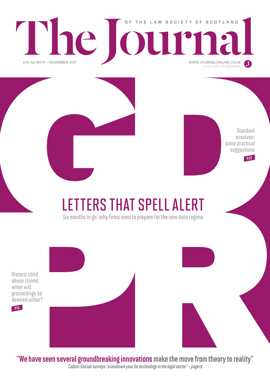When 25 is the new 35

In October 2016 I was a delegate to Scotland’s Rural Parliament in Brechin. As a serial attendee at various political gatherings, it was a breath of fresh air to witness and be part of an assembly of folk from all over the country who set the agenda themselves, then explored, debated and decided in a wholly consensual way the outcomes of the event.
All this was facilitated by Andy Lippok and Gordon Carmichael of Connecting Scotland. A most enjoyable get-together was followed by my discussing with them team self-management and a better life/work balance for those involved in Conveyancing Direct, matters which had been playing on my mind over a few weeks. Andy introduced me to Self management: how it does work, a book by Astrid Vermeer and Ben Wenting, which highlights businesses and organisations operating such systems, including the Netherlands’ largest provider of home care, Buurtzorg.
Staff led
Connecting Scotland facilitated a staff meeting in November last year where the idea of reducing weekly core hours from 35 to 25 with no loss of salary, while maintaining and increasing business and enhancing client satisfaction, was discussed.
Apart from indicating that whatever was agreed at the end of this exercise would require unanimity among the staff, I took very little part in the meeting, which no doubt contributed to the free flow of discussion and the possibilities and challenges it presented.
While all liked the idea for a variety of personal reasons, there was a healthy scepticism, particularly among the older staff members. Despite this, it was agreed that a working group be established, chosen randomly by those present, to work with me on a framework document.
Employment law obstacle
As we only do domestic conveyancing, our set-up is fairly straightforward. We had a marketing team to provide quotes, issue terms of business agreement and deal with client compliance. Our missivers dealt with missives and our settlors dealt with the rest of the conveyancing. A title report solicitor examined all titles, while another solicitor handled land registration.
Our opening hours are 8am to 6pm Monday to Friday, staff holiday entitlement is four weeks, and we were keen to preserve these hours in any changes.
As I drafted the framework document I was aware that while one of its purposes was to improve employment for our staff, how this could be achieved in practice within the constraints of our fee income led me quickly to deduce that employment law in this country can lack flexibility, particularly on holiday remuneration and shift breaks. The irony of employment law being an impediment to enhanced work conditions will not be lost on those working to protect folk on zero hours contracts and the like.
As a result, the framework document could not be a legal document but is accepted by everyone in Conveyancing Direct, through their goodwill, as a living document which can be and is adapted by consensus as experience dictates.
Team tasks
For such a fundamental change one could be forgiven for thinking that to attempt a radical reduction in everyone’s working hours of 400 per annum, introduce a self-management team arrangement and move to a nearly paperless office, all simultaneously, was as big a challenge as Brexit appears to be to the UK Government.
It was, but through a very brief period of intense discussion, employment of our own in-house IT support, modest upgrades to our own case management system and my wife who gave the office a makeover, we managed to kick things off on 16 January 2017.
Away went the marketing, title report and land registration positions and in their stead we created three conveyancing teams of six folk, two of whom would handle new business, compliance, etc, two who would cover the missives and two settlors who would deal with all other issues up to settlement. All the staff decided among themselves who would be in each team, without interference from me.
Each team would split the shifts between them, agree holidays, adjust the case management templates to their team’s requirements, create their own client relations system, interview and approve potential new recruits to their team, and upgrade their team members’ skills, all agreed in team meetings in their own unpaid time. Teams were burdened with the need to resolve their own internal issues, and only when these had reached a certain limit would the partners get involved. Team members would work double shifts when their team mate was absent. Each team shares a bonus pot equally at the year end, the amount and conditions of which are determined at the start of the year.
In addition to the conveyancing team and a cashroom team, a title register team was created to handle title examination and registration to address the current challenges of registration which the Keeper of the Land Register has kindly gifted us.
Nine months on
After nine months we held a review day one Sunday which most of the staff managed to attend, again facilitated by Connecting Scotland.
Most results did not surprise me, albeit the changes are still a work in progress, and to be honest always will be, as the framework document requires adaptation. Thus far it has been surprisingly robust. Astrid Vermeer has kindly provided valued comments on how we develop the new working relationship as the framework document matures.
A number of staff regularly try to keep to their core five hours a day. Those who don’t have nevertheless reduced their hours proportionately, and such additional work is voluntary and unpaid. We constantly examine ways to reduce duplication and surface mail by enhanced IT and improved communication of working as a team.
As work stations are shared by team members, the reduction in clutter and paper mountains is liberating, and we now only require about a third of our office accommodation.
The opportunity for someone to be isolated and left floundering with a file has been removed, as the team has collegiate ownership of the file and at worst can flounder together.
The simple act of reducing the core hours while maintaining business levels has increased productivity by 30%, a figure of which most western democratic governments couldn’t even dream.
Staff members can now use their free time to reduce their childminding costs, support their older relatives, improve their legal knowledge, do other courses or simply chill out.
Holidays and absences have not proved too challenging, and through the coherence of the teams there have only been two shifts where a partner had to step in to fill a gap through an unforeseeable event.
Can we have some more
What we have done has not suited everyone, and we said goodbye to two staff members who found the going tough and sought pastures new. One then had second thoughts, but by then we had someone else whom the team had approved. We have replaced another with a former employee who returned because the new framework now allows her to take holidays at the same time as her husband, a member of one of our other teams, when this was not possible before.
It is still early days, but we are now going beyond the original framework. We are providing all staff at Conveyancing Direct with the information of the costs and challenges of running a highly regulated business, and we are excited as to where that may lead.
In the meantime I had the pleasure of attending a meeting at which Frances O’Grady, the General Secretary of the TUC, spoke on “How do we get more jobs of the sort of work that works for everyone?” When she heard our story she asked for a job!
In this issue
- Immigration detention: a case of overuse
- Sexual harassment: don't suffer in silence
- Child disputes: a quicker way through?
- Brexit: where are we now and what happens next?
- Reading for pleasure
- Opinion: Claire McKee
- Book reviews
- Profile
- President's column
- ScotLIS: the citizens' tool
- People on the move
- People matter
- Historic abuse: the fairness matrix
- Landmark year in legal IT
- Sentence, but no full stop
- Opening up arbitration
- Making the agent pay
- Equal pay: beware the mass claims
- Dealing with conflict
- Claims outside the rules
- Pension transfers – history repeating itself?
- Last instructions
- Scottish Solicitors' Discipline Tribunal
- Standard missives: an unachievable dream?
- SOLAR powered
- Disability rights
- Law reform roundup
- Too hard a drive?
- Settlement: can you avoid cheques?
- Q & A corner
- When 25 is the new 35
- Sorry; not sorry
- Ask Ash
- Plan sets ambitious 2017-18 targets
- Letting agents: prepare to register
- Paralegal pointers
- A way to make an impact






